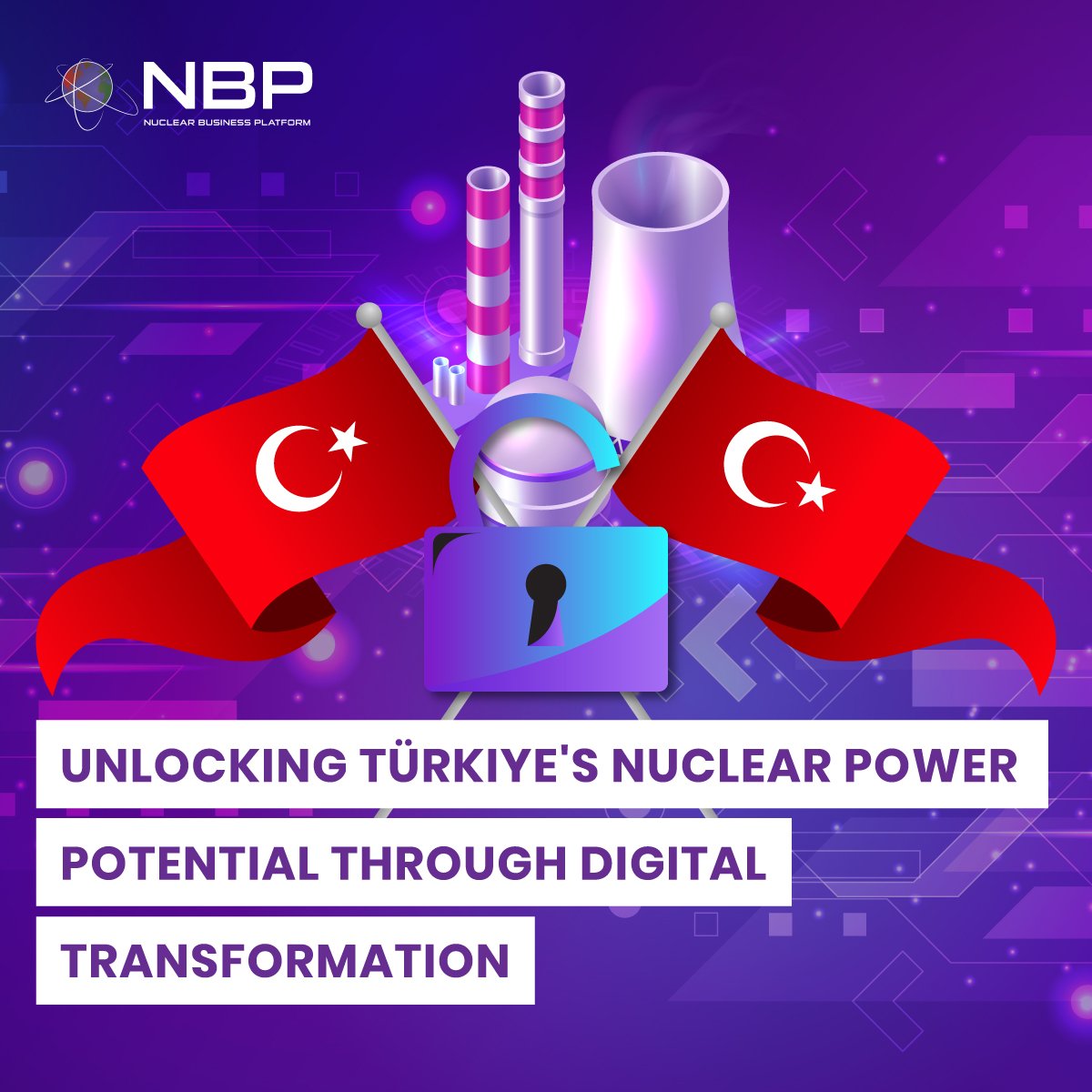Unlocking Türkiye's Nuclear Power Potential through Digital Transformation
Türkiye's foray into nuclear power marks a significant step towards meeting its energy demands while ushering in a cleaner energy future. In this journey, the integration of digital technologies emerges as a cornerstone, offering multifaceted benefits to the nuclear sector. As Türkiye embarks on an ambitious nuclear energy program, with plans to construct three nuclear power plants (NPPs) totaling 14.3 GWe by 2030, the digitalization of its nuclear sector not only promises enhanced efficiency and safety but also presents substantial business opportunities. Let's explore how this digital transformation is poised to reshape Türkiye's nuclear landscape and unlock its potential.
Incorporating these digital technologies into Turkiye's nuclear energy program requires a well-defined digitalization strategy, substantial investment in infrastructure and training, and a commitment to cybersecurity. However, the potential benefits in terms of safety, efficiency, and sustainability make the integration of digital technologies a compelling avenue for enhancing Turkiye's nuclear energy capabilities.
Enhancing Operational Efficiency
Digital technologies can significantly enhance operational efficiency in Türkiye’s rising future nuclear power plants. For instance, advanced analytics and machine learning algorithms can be used to optimize fuel usage and thermal efficiency, leading to cost savings. Moreover, predictive maintenance, enabled by digital tools, can help identify potential equipment failures before they occur, reducing unplanned downtime and associated costs. Advanced analytics can process data in real-time, allowing for quicker identification of anomalies or safety concerns. Machine learning algorithms can identify patterns and trends that lead to more efficient and cost-effective processes.
Improving Safety Measures
Digitalization can also lead to improved safety measures. Real-time monitoring systems can provide continuous feedback on operational parameters, allowing for immediate response to any anomalies. This is particularly important in a nuclear setting where early detection of issues is critical. In addition, digital twin technology can be used for safety training, allowing operators to simulate various scenarios and responses in a risk-free environment.
Extending Plant Lifetimes
The use of digital technologies can help extend the operational lifetimes of Türkiye’s future nuclear power plants. Digital tools can monitor the condition of equipment and infrastructure, providing data that can inform decisions about when to repair or replace components. This not only helps to prevent failures but also optimizes the use of resources.
Addressing Workforce Challenges
The nuclear sector globally has a deficit of proficient workforce. In Türkiye, digital tools can help address this issue by automating routine tasks and facilitating knowledge transfer between experienced and less experienced workers. For example, augmented reality (AR) can be used for on-the-job training, providing workers with real-time information and guidance as they perform their tasks. Simulations can also be used to model various scenarios for safety assessments and emergency response preparedness.
Supporting Regulatory Compliance
Digitalization can also support regulatory compliance in the Turkish nuclear sector. Digital tools can automate the collection and reporting of regulatory data, reducing the risk of errors, non-compliance, and reducing administrative burdens on nuclear operators. They can also provide a transparent and auditable trail of information for regulators.
Facilitating Stakeholder Communication
Digital platforms can facilitate communication with various stakeholders, including regulators, the local community, and the wider public. For example, virtual tours of nuclear facilities can be offered to increase public understanding and acceptance of nuclear energy in Türkiye.
Grid Integration and Energy Storage
Digitalization can facilitate the integration of nuclear power into the broader energy grid. This includes managing the interplay between nuclear, renewable, and conventional energy sources and optimizing energy storage solutions for grid stability.
Environmental Monitoring and Compliance
Environmental regulations are a crucial aspect of nuclear power. Digital tools can automate the monitoring of emissions, radiation levels, and other environmental factors, ensuring compliance with Türkiye's environmental standards and providing data for reporting and audits. For instance, Digital sensors and remote sensing technologies can monitor environmental factors, helping ensure that nuclear facilities operate within established environmental limits.
Supply Chain Optimization
The process of digitalization has the potential to enhance the supply chain management for the upcoming nuclear power plants in Türkiye. From procurement and inventory management to tracking deliveries and quality control, digital tools streamline the supply chain, reducing costs and ensuring the timely availability of critical components.
In conclusion, integrating digital technologies into Türkiye's nuclear power sector is a transformative journey marked by remarkable opportunities. It promises to enhance operational efficiency, improve safety measures, extend plant lifetimes, address workforce challenges, support regulatory compliance, and facilitate effective stakeholder communication. These advancements not only propel Türkiye towards a cleaner and more sustainable energy future but also position the country as a leader in the global nuclear energy landscape. Within the framework of the Turkish National Energy Plan, the electricity to be produced from nuclear power plants in Türkiye will reach 11.1% of the total production by 2030. Therefore, the digitalization of Türkiye's nuclear sector not only elevates the nation's energy capabilities but also fuels economic growth and innovation considering the business opportunities ahead.
Opportunities in the Turkish nuclear market will be discussed during the Türkiye NBP 2023 conference and exhibition which will take place 6-8 November in Antalya. This industry meeting is hosted by Nükleer Teknik Destek Anonim Şirketi (NÜTED A.Ş.). An exclusive technical site-visit to the Akkuyu nuclear plant site is also scheduled as part of Türkiye NBP 2023
For more information and to download the detailed meeting agenda visit - www.nuclearbusiness-platform.com/turkiye/tnbp-2023



